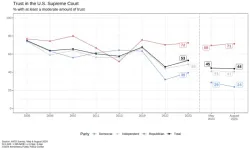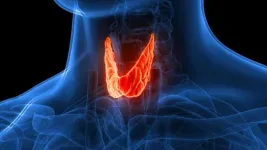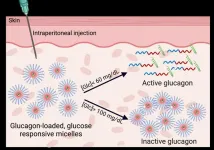(Press-News.org) BUFFALO, N.Y. — A small University at Buffalo clinical trial has found that at low doses, lithium aspartate is ineffective in treating the fatigue and brain fog that is often a persistent feature of long COVID; however, a supplemental dose-finding study found some evidence that higher doses may be effective.
Published in JAMA Network Open on Oct. 2, the study was led by Thomas J. Guttuso, Jr., MD, professor of neurology in the Jacobs School of Medicine and Biomedical Sciences at UB and a physician with UBMD Neurology.
“It’s a negative study with a positive twist,” Guttuso concludes.
Because long COVID is believed to stem from chronic inflammation and lithium has known anti-inflammatory actions, Guttuso had recommended that a patient of his try low-dose lithium for persistent long COVID symptoms. He was surprised when this patient reported a near full resolution of fatigue and brain fog within a few days of initiating lithium aspartate at 5 milligrams a day.
Relief from symptoms
Based on this single case, Guttuso became interested in lithium aspartate as a potential treatment for long COVID and recommended it to other such patients.
According to Guttuso, 9 of 10 long COVID patients he treated with lithium aspartate 5-15mg a day saw very good benefit in terms of improvements to their fatigue and brain fog symptoms.
“Based on those nine patients, I had high hopes that we would see an effect from this randomized controlled trial,” says Guttuso. “But that’s the nature of research. Sometimes you are unpleasantly surprised.”
The randomized controlled trial showed no benefit from 10-15 milligrams a day of lithium aspartate compared to patients receiving a placebo.
After one patient from the study subsequently increased the lithium aspartate dosage to 40 milligrams a day and experienced a marked reduction in fatigue and brain fog symptoms, Guttuso decided to then conduct a dose-finding study designed to explore if a higher dose of lithium aspartate may be effective.
The three participants who completed the dose-finding study reported greater declines in fatigue and brain fog with the higher dose of 40-45 milligrams per day. This was especially true in the two patients with blood lithium concentrations of 0.18 and 0.49 millimoles per liter (mmol/L) compared to one patient with a level of 0.10mmol/L who saw partial improvements.
“This is a very small number of patients, so these findings can only be seen as preliminary,” says Guttuso. “Perhaps achieving higher blood levels of lithium may provide improvements to fatigue and brain fog in long COVID.”
Dosage may be too low
He notes that it is possible the randomized controlled trial was ineffective because the dose of lithium aspartate that was used was too low.
“The take-home message is that very low dose lithium aspartate, 10-15 milligrams a day, is ineffective in treating the fatigue and brain fog of long COVID,” says Guttuso. “Perhaps we need to do another randomized controlled trial that uses higher lithium aspartate dosages that achieve blood lithium levels of 0.18-0.50mmol/L to determine if they could be effective.”
An estimated 17 million people have long COVID in the U.S., and worldwide the number is estimated at 65 million.
“There currently are no evidence-based therapies for long COVID,” says Guttuso. He hopes that the National Institutes of Health will view lithium as worth studying through a trial with higher dosages; the NIH is allocating an additional $500 million to study long COVID therapies that appear to be promising.
Guttuso adds that if a subsequent randomized controlled trial finds that higher dosages of lithium aspartate are effective, long COVID patients would still need to discuss taking it with their health care providers; in addition, he says, if they do begin taking it at higher dosages, blood lithium levels should be monitored.
Co-authors with Guttuso are Gregory E. Wilding, PhD, professor, and Jingtao Zhu, research assistant, both of the Department of Biostatistics in the UB School of Public Health and Health Professions.
The UB trial was funded as a pilot project by UB’s Clinical and Translational Science Institute.
END
Study: For long COVID, lithium aspartate at low doses is ineffective, but higher doses may be promising
UB researcher characterizes the findings published in JAMA Network Open as “a negative study with a positive twist”
2024-10-02
ELSE PRESS RELEASES FROM THIS DATE:
Online insomnia treatment can help caregivers get much-needed rest, study suggests
2024-10-02
Providing care for a family member with a disabling illness can be a demanding job that leaves many people unable to sleep, but an online insomnia treatment developed at the University of Virginia School of Medicine can help, new research shows.
Not only did the SHUTi (Sleep Healthy Using the Internet) sleep intervention help caregivers get better rest, it most benefited those shouldering the greatest responsibilities in caring for their loved ones, the researchers found.
The results suggest the online format of the program ...
Attivare licenses Wyss Institute’s immune-modulating biomaterial technology to advance immunotherapies
2024-10-02
Attivare licenses Wyss Institute’s immune-modulating biomaterial technology to advance immunotherapies
The company is developing the biomaterial-based technology to develop novel therapies able to program anti-cancer immunity and prevent infectious diseases
By Benjamin Boettner
(BOSTON) — Today, the Wyss Institute for Biologically Inspired Engineering at Harvard University and Attivare Therapeutics Inc. announced that Attivare has licensed a portfolio of immune-modulating biomaterial technologies from Harvard University that was created at the ...
Regenstrief, Fairbanks researcher among 25 fellows to be inducted into American College of Medical Informatics
2024-10-02
The American College of Medical Informatics (ACMI) has announced that Chris Harle, PhD, of the Indiana University Richard M. Fairbanks School of Public Health and the Regenstrief Institute will be inducted as one of 25 new fellows on November 10 in San Francisco, CA, at ceremonies during the American Medical Informatics Association (AMIA) 2024 Annual Symposium.
ACMI is a college of elected fellows who have made significant and sustained contributions to the field of biomedical informatics. Individuals who have achieved national recognition in the field and are committed to advancing ...
Ontario Institute for Cancer Research funding aims to speed the development of new drugs for some of the most common cancers
2024-10-02
October 2, 2024, TORONTO – The Ontario Institute for Cancer Research (OICR) continues to support Ontario drug discovery research by funding high-quality investigations of new therapies for some of the most prevalent pediatric and adult cancers. These projects are tackling substantial challenges in cancer by increasing the effectiveness and availability of immunotherapies, making cancer more vulnerable to chemotherapy and developing a new drug for one of the deadliest forms of childhood brain cancer.
OICR’s Cancer Therapeutics Innovation Pipeline (CTIP) initiative is supporting three research teams ...
Trust in US Supreme Court continues to sink
2024-10-02
PHILADELPHIA – Driven by political partisanship, public trust in the U.S. Supreme Court has continued a downward slide since the court’s 2022 Dobbs decision overturning the Roe v. Wade ruling that established a constitutional right to abortion, according to a new survey by the Annenberg Public Policy Center (APPC) of the University of Pennsylvania.
More than half of Americans (56%) now disapprove of the Supreme Court, saying they trust it either “a little” or “not at all” to act in the best interest ...
Rice’s Biotech Launch Pad to lead commercialization of bioelectrical implant treatment for obesity, type 2 diabetes
2024-10-02
Rice University is part of a multiuniversity research team that has secured an award of up to $34.9 million from the Advanced Research Projects Agency for Health (ARPA-H) to accelerate the development of a bioelectronic implant designed to improve adherence for obesity and type 2 diabetes (T2D) treatment while reducing development and manufacturing costs.
Rice University’s Biotech Launch Pad will lead the commercialization effort for “Rx On-site Generation Using Electronics” (ROGUE), a self-contained, durable implantable device that houses cells engineered ...
Carnegie Mellon to lead development of implantable cell-based bioelectronic devices for patient-specific treatment and disease monitoring
2024-10-02
PITTSBURGH – A Carnegie Mellon University-led team has secured an award of up to $42 million from the Advanced Research Projects Agency for Health (ARPA-H) to accelerate the development of implantable, cell-based bioelectronic devices that deliver patient-specific therapy and monitor disease status, for conditions like hypo- and hyperthyroidism, in real time. This award is part of the ARPA-H REACT program, which supports the advancement of implantable bioelectronic devices to improve patient management of chronic diseases.
Burak ...
Case Western Reserve, Vanderbilt universities to develop incisionless prostate surgery using MRI and robotics
2024-10-02
CLEVELAND—Researchers at Case Western Reserve University and Vanderbilt University are pioneering a new approach to prostate cancer surgery by combining advanced robotics and “low-field” MRI technology.
The research aims to allow highly accurate, patient-tailored prostate cancer surgeries without the need for traditional incisions. This innovative research marks a major step in developing minimally invasive treatments for prostate cancer, with the potential to improve both safety and efficiency for patients.
The project is being funded by a new five-year, $3.7 million grant from the National Cancer Institute, part of the ...
Carnegie Mellon University secures ARPA-H award to improve adherence, lower cost of treatment for obesity and Type 2 diabetes patients
2024-10-02
PITTSBURGH – A Carnegie Mellon University-led team of researchers has secured an award of up to $34.9 million from the Advanced Research Projects Agency for Health (ARPA-H). The funds will fast track a bioelectronic implant that could radically improve treatment options and significantly reduce the cost of care for patients with obesity and Type 2 diabetes.
The award will drive the accelerated development and testing of “Rx On-site Generation Using Electronics (ROGUE),” a bioelectrical device that hosts a “living pharmacy,” consisting of engineered cells that produce biological therapy to treat Type 2 diabetes and obesity. The device will offer continuous, ...
A new injectable to prevent and treat hypoglycemia
2024-10-02
People with diabetes take insulin to lower high blood sugar. However, if glucose levels plunge too low — from taking too much insulin or not eating enough sugar — people can experience hypoglycemia, which can lead to dizziness, cognitive impairment, seizures or comas. To prevent and treat this condition, researchers in ACS Central Science report encapsulating the hormone glucagon. In mouse trials, the nanocapsules activated when blood sugar levels dropped dangerously low and quickly restored glucose levels.
Glucagon is a hormone that signals the liver to ...
LAST 30 PRESS RELEASES:
Tiny bubbles, big breakthrough: Cracking cancer’s “fortress”
A biological material that becomes stronger when wet could replace plastics
Glacial feast: Seals caught closer to glaciers had fuller stomachs
Get the picture? High-tech, low-cost lens focuses on global consumer markets
Antimicrobial resistance in foodborne bacteria remains a public health concern in Europe
Safer batteries for storing energy at massive scale
How can you rescue a “kidnapped” robot? A new AI system helps the robot regain its sense of location in dynamic, ever-changing environments
Brainwaves of mothers and children synchronize when playing together – even in an acquired language
A holiday to better recovery
Cal Poly’s fifth Climate Solutions Now conference to take place Feb. 23-27
Mask-wearing during COVID-19 linked to reduced air pollution–triggered heart attack risk in Japan
Achieving cross-coupling reactions of fatty amide reduction radicals via iridium-photorelay catalysis and other strategies
Shorter may be sweeter: Study finds 15-second health ads can curb junk food cravings
Family relationships identified in Stone Age graves on Gotland
Effectiveness of exercise to ease osteoarthritis symptoms likely minimal and transient
Cost of copper must rise double to meet basic copper needs
A gel for wounds that won’t heal
Iron, carbon, and the art of toxic cleanup
Organic soil amendments work together to help sandy soils hold water longer, study finds
Hidden carbon in mangrove soils may play a larger role in climate regulation than previously thought
Weight-loss wonder pills prompt scrutiny of key ingredient
Nonprofit leader Diane Dodge to receive 2026 Penn Nursing Renfield Foundation Award for Global Women’s Health
Maternal smoking during pregnancy may be linked to higher blood pressure in children, NIH study finds
New Lund model aims to shorten the path to life-saving cell and gene therapies
Researchers create ultra-stretchable, liquid-repellent materials via laser ablation
Combining AI with OCT shows potential for detecting lipid-rich plaques in coronary arteries
SeaCast revolutionizes Mediterranean Sea forecasting with AI-powered speed and accuracy
JMIR Publications’ JMIR Bioinformatics and Biotechnology invites submissions on Bridging Data, AI, and Innovation to Transform Health
Honey bees navigate more precisely than previously thought
Air pollution may directly contribute to Alzheimer’s disease
[Press-News.org] Study: For long COVID, lithium aspartate at low doses is ineffective, but higher doses may be promisingUB researcher characterizes the findings published in JAMA Network Open as “a negative study with a positive twist”







